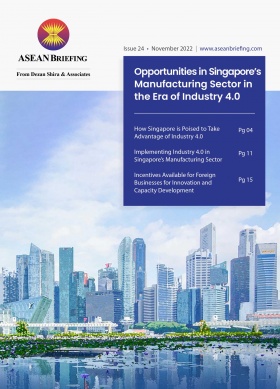A Guide to Personal Income Tax in Singapore
Personal income tax in Singapore is based on a progressive tax system, with taxes ranging from 0 to 22.5 percent for 2023. For foreigners in Singapore, their tax liability is dependent on their tax residency status.
Foreigners are considered tax residents if they:
- Stay or work in Singapore for more than 183 days in a calendar year;
- A Singapore permanent resident who has a permanent home in Singapore; or
- Continuously work in Singapore for three consecutive years.
Income tax rates in Singapore
Singapore levies a progressive individual income tax rate on tax residents, with the headline personal income tax currently at 22 percent. The progressive tax rates on chargeable income for tax residents are as follows:
From 2024 onward, Singapore will increase the headline personal income tax rate to 24 percent. Chargeable income between S$500,000 (approx, US$370,000) to S$1 million will be taxed at 23 percent, while chargeable income in excess of S$1 million (approx, US$741,000) will be taxed at 24 percent.
|
IIT Tax Rates from 2017 to 2023 |
||
|
Chargeable income |
Tax rate (%) |
Gross taxable |
|
First S$20,000 (US$14,830) |
0 |
S$0 |
|
Next S$10,000 (US$7,400) |
2 |
S$200 (US$148) |
|
First S$30,000 (US$22,247) |
– |
S$200 (US$148) |
|
Next S$10,000 (US$7,400) |
3.5 |
S$350 (US$259) |
|
First S$40,000 (US$29,508) |
– |
S$550 (US$407) |
|
Next S$40,000 (US$29,508) |
7 |
S$2,800 (US$2,076) |
|
First S$80,000 (US$59,016) |
– |
S$3,350 (US$2,484) |
|
Next S$40,000 (US$29,508) |
11.5 |
S$4,600 (US$3,411) |
|
First S$120,000 (US$88,524) |
– |
S$7,950 (US$5,895) |
|
Next S$40,000 (US$29,508) |
15 |
S$6,000 (US$4,426) |
|
First S$160,000 (US$119,076) |
– |
S$13,950 (US$10,258) |
|
Next S$40,000 (US$29,508) |
18 |
S$7,200 (US$5,311) |
|
First S$200,000 (US$118,033) |
– |
S$21,150 (US$15,602) |
|
Next S$40,000 (US$29,508) |
19 |
S$7,600 (US$5,607) |
|
First S$240,000 (US$177,049) |
– |
S$28,750 (US$21,209) |
|
Next S$40,000 (US$29,508) |
19.5 |
S$7,800 (US$5,754) |
|
First S$280,000 (US$206,557) |
– |
S$36,550 (US$26,963) |
|
Next S$40,000 (US$29,508) |
20 |
S$8,000 (US$5,902) |
|
First S$320,000 (US$236,065) |
– |
S$44,500 (US$32828) |
|
Excess S$320,000 (US$236,065) |
22 |
|
|
IIT Tax Rates from 2024 Onward |
||
|
Chargeable income |
Tax rate (%) |
Gross taxable |
|
First $20,000 (US$14,754) |
0 |
S$0 |
|
Next $10,000 (US$7,400) |
2 |
S$200 (US$147.5) |
|
First $30,000 (US$22,131) |
– |
S$200 (US$147.5) |
|
Next $10,000 (US$7,400) |
3.50 |
S$350 (US$258) |
|
First $40,000 (US$29,508) |
– |
S$550 (US$405.7) |
|
Next $40,000 (US$29,508) |
7 |
S$2,800 (US$2,065) |
|
First $80,000 (US$59,016) |
– |
S$3,350 (US$2,471) |
|
Next $40,000 (US$29,508) |
11.5 |
S$4,600 (US$3,393) |
|
First $120,000 (US$88,524) |
– |
S$7,950 (US$5,864) |
|
Next $40,000 (US$29,508) |
15 |
S$6,000 (US$4,426) |
|
First $160,000 (US$118,032) |
– |
S$13,950 (US$10,291) |
|
Next $40,000 (US$29,508) |
18 |
S$7,200 (US$5,311) |
|
First $200,000 (US$147,541) |
– |
S$21,150 (US$15,602) |
|
Next $40,000 (US$29,508) |
19 |
S$7,600 (US$5,607) |
|
First $240,000 (US$177,049) |
– |
S$28,750 (US$21,209) |
|
Next $40,000 (US$29,508) |
19.5 |
S$7,800 (US$5,754) |
|
First $280,000 (US$206,557) |
– |
S$36,550 (US$26,963) |
|
Next $40,000 (US$29,508) |
20 |
S$8,000 (US$5902) |
|
First $320,000 (US$236,065) |
– |
S$44,550 (US$32,865) |
|
Next $180,000 (US$132787) |
22 |
S$39,600 (US$29,213) |
|
First $500,000 (US$368,852) |
– |
S$84,150 (US$62,078) |
|
Next $500,000 (US$368,852) |
23 |
S$115,000 (US$84,836) |
|
First $1,000,000 (US$737,705) |
– |
S$199,150 (US$14,6914) |
|
In excess of $1,000,000 (US$737,705) |
24 |
|
Non-tax residents are taxed at a flat rate of 15 percent.
Filing personal income tax returns
Each taxpayer in Singapore is obligated to make an annual return of income on a yearly basis. The tax return must be submitted by April 15. This can be done online or via mail.
The appropriate form to be filled out depends on the individual’s tax residency status:
- Tax resident individuals need to file Form B1.
- Self-employed individuals need to file Form B.
- Non-resident individuals need to file Form M.
Singapore’s IRAS can take legal action against individuals who do not file their tax returns or for non-payment of taxes.
Webinar – Navigating Global Minimum Tax in Asia: Insights for Businesses
Thursday, November 16, 2023 | 9:00 AM San Francisco / 12:00 PM New York / 6:00 PM Brussels / 1:00 AM (Nov. 17th) Beijing
Partner Kyle Freeman will introduce how key Asian economies are implementing the new changes, how companies are going to be impacted, and what businesses should be doing now.
Taxes on employer benefits
Benefits received from employers are taxable unless they are specifically exempt from income tax under an existing incentive.
Examples of benefits that are taxable include:
- Overtime payments;
- The motor vehicle provided by the employer;
- Subscription, entrance fees, memberships;
- Share options;
- Residential accommodation;
- Food and clothing;
- Allowances; and
- Medical reimbursements for dependents.
About Us
ASEAN Briefing is produced by Dezan Shira & Associates. The firm assists foreign investors throughout Asia and maintains offices throughout ASEAN, including in Singapore, Hanoi, Ho Chi Minh City, and Da Nang in Vietnam, in addition to Jakarta, in Indonesia. We also have partner firms in Malaysia, the Philippines, and Thailand as well as our practices in China and India. Please contact us at asean@dezshira.com or visit our website at www.dezshira.com.
- Previous Article Understanding Social Insurance in Singapore
- Next Article Navigating Intellectual Property Rights in Singapore: An Overview







